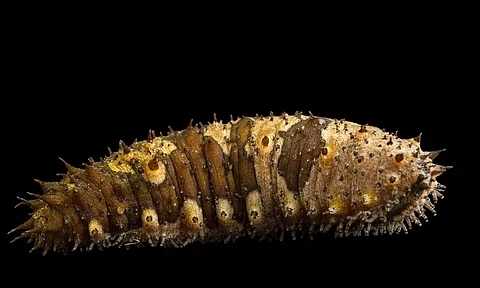
- Home
- Live Blog
- Breaking News
- Top Headlines
- Cities
- NE News
- Sentinel Media
- Sports
- Education
- Jobs

NEW DELHI: The southern coastline, including Lakshadweep, continues to see a rising trend of marine crimes, including the poaching of sea cucumbers, a protected species in India but a delicacy counted among the 'four treasures' of Cantonese cuisine of China.
A few weeks back, over 500 kg of sea cucumber worth Rs 2.25 crore was seized off the Tamil Nadu coast near the Indian Maritime Boundary Line (IMBL). In March this year, the Coastal Security Group (CSG) of Tamil Nadu police seized 1,080 kg of sea cucumber worth crores of rupees in the international market from Nagapattinam.
As per the recently released report titled 'Illegal Trade of Marine Species in India: 2015-2021', "a total of 187 incidents of illegal trade of marine species were collated between January 2015 and December 2021".
Pointing to the hotspots of marine crime – Sri Lanka and southern India – Teale Phelps Bondaroff, director of research for marine conservation organisation OceansAsia, said, "There is a difference in law between the two countries. India issued a blanket ban on all sea cucumber fishing in 2001, and sea cucumbers are protected under Schedule I of the Indian Wildlife (Protection) Act of 1972.
"By contrast, in Sri Lanka, sea cucumber harvesting is permitted, but licence is required for fishing and export. As a result, criminals frequently attempt to smuggle sea cucumbers they illegally catch in India into Sri Lanka in order to launder and re-export them to Southeast Asian markets, where they are sold for food and traditional Chinese medicine."
Much of this illicit trade is driven by greed. A high demand for sea cucumbers for luxury food and traditional Chinese medicine has led to increasing price of sea cucumbers – 1 kg white teatfish could sell for as much as $400 in Hong Kong, Bondaroff said.
The other factor is 'roving bandits'. As populations of sea cucumbers in one area are extirpated as a result of overfishing, fishers may move to other areas, which are in turn overfished. This results in what is called serial exploitation, and the individuals involved have been referred to as roving bandits.
Bondaroff said: "My study suggested that this may be the case. By mapping the incidents, the study identified the Gulf of Mannar/Palk Bay region as a global hotspot for sea cucumber crime. Recently, Lakshadweep has been the location of increased number of smuggling and poaching incidents, showing that sea cucumber crime is expanding into this remote island chain."
He added: "One of the reasons as to why we have seen an increase in arrests over the past two years is due to increased vigilance on the part of the authorities."
India recently formed the Lakshadweep Sea Cucumber Protection Task Force, established a number of 'anti-poaching camps' in the islands, and also created the world's first conservation area for sea cucumbers in February 2020 -- the K.K. Mohammed Koya Sea Cucumber Conservation Reserve, a 239 sq km area near Cheriyapani, Laksadweep.
"These efforts should be lauded as they are important measures to protect sea cucumbers and to tackle poaching and smuggling," Bondaroff said. IANS
Also Watch: